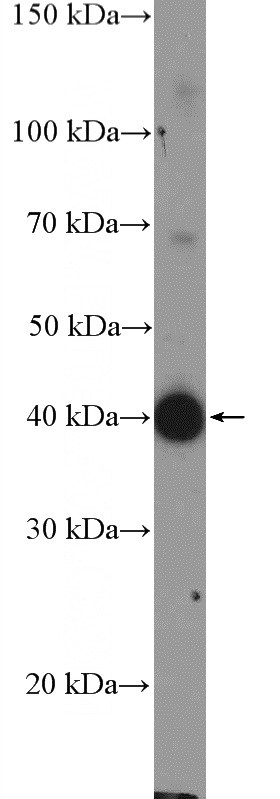-
Product Name
AP1,JUN,P39 antibody
- Documents
-
Description
AP1,JUN,P39 Rabbit Polyclonal antibody. Positive IHC detected in human cervical cancer tissue. Positive WB detected in HEK-293 cells, mouse brain tissue, NIH/3T3 cells. Positive IP detected in HEK-293 cells. Observed molecular weight by Western-blot: 36 kDa,40-45 kDa
-
Tested applications
ELISA, IHC, IP, WB
-
Species reactivity
Human,Mouse,Rat; other species not tested.
-
Alternative names
Activator protein 1 antibody; AP 1 antibody; AP1 antibody; c Jun antibody; JUN antibody; jun oncogene antibody; P39 antibody; Proto oncogene c Jun antibody; Transcription factor AP 1 antibody
-
Isotype
Rabbit IgG
-
Preparation
This antibody was obtained by immunization of Recombinant Protein (Accession Number: BC002646). Purification method: Antigen affinity purified.
-
Clonality
Polyclonal
-
Formulation
PBS with 0.1% sodium azide and 50% glycerol pH 7.3.
-
Storage instructions
Store at -20℃. DO NOT ALIQUOT
-
Applications
Recommended Dilution:
WB: 1:200-1:2000
IP: 1:200-1:2000
IHC: 1:20-1:200
-
Validations

HEK-293 cells were subjected to SDS PAGE followed by western blot with Catalog No:108113(AP1,JUN,P39 Antibody) at dilution of 1:600

IP Result of anti-AP1,JUN,P39 (IP:Catalog No:108113, 4ug; Detection:Catalog No:108113 1:500) with HEK-293 cells lysate 2800ug.

Immunohistochemistry of paraffin-embedded human cervical cancer tissue slide using Catalog No:108113(AP1,JUN,P39 Antibody) at dilution of 1:50 (under 40x lens)
-
Background
JUN is also named as c-Jun and AP1, belongs to the bZIP family and Jun subfamily. JUN, the most extensively studied protein of the activator protein-1 (AP-1) complex, is involved in numerous cell activities, such as proliferation, apoptosis, survival, tumorigenesis and tissue morphogenesis[PMID: 22180088]. JUN is a transcription factor that recognizes and binds to the enhancer heptamer motif 5'-TGA[CG]TCA-3'. It promotes activity of NR5A1 when phosphorylated by HIPK3 leading to increased steroidogenic gene expression upon cAMP signaling pathway stimulation. JUN is a basic leucine zipper (bZIP) transcription factor that acts as homo- or heterodimer, binding to DNA and regulating gene transcription[PMID: 9732876]. In additon, extracellular signals can induce post-translational modifications of JUN, resulting in altered transcriptional activity and target gene expression[PMID:8464713]. More over, it has uncovered multiple layers of a complex regulatory scheme in which JUN is able to crosstalk, amplify and integrate different signals for tissue development and disease. Jun is predominantly nuclear, ubiquitinated Jun colocalizes with lysosomal proteins[PMID: 15469925]. This antibody is a rabbit polyclonal antibody raised against a region of human JUN.
-
References
- Liu M, Xu Y, Han X. Potent effects of flavonoid-rich extract from Rosa laevigata Michx fruit against hydrogen peroxide-induced damage in PC12 cells via attenuation of oxidative stress, inflammation and apoptosis. Molecules (Basel, Switzerland). 19(8):11816-32. 2014.
- Tao X, Wan X, Xu Y. Dioscin attenuates hepatic ischemia-reperfusion injury in rats through inhibition of oxidative-nitrative stress, inflammation and apoptosis. Transplantation. 98(6):604-11. 2014.
- Dong D, Qi Y, Xu L. Total saponins from Rosa laevigata Michx fruit attenuates hepatic steatosis induced by high-fat diet in rats. Food & function. 5(12):3065-75. 2014.
- Xia Q, Hu Q, Wang H. Induction of COX-2-PGE2 synthesis by activation of the MAPK/ERK pathway contributes to neuronal death triggered by TDP-43-depleted microglia. Cell death & disease. 6:e1702. 2015.
- Liu M, Xu L, Yin L. Potent effects of dioscin against obesity in mice. Scientific reports. 5:7973. 2015.
- Zhang X, Han X, Yin L. Potent effects of dioscin against liver fibrosis. Scientific reports. 5:9713. 2015.
Related Products / Services
Please note: All products are "FOR RESEARCH USE ONLY AND ARE NOT INTENDED FOR DIAGNOSTIC OR THERAPEUTIC USE"
